现在完成时讲解及练习(附答案)-名师精讲
现在完成时精讲及习题答案

现在完成时1.构成现在完成时是由助动词 have(has)+动词的过去分词构成。
助动词说明该谓语是属于现在时范围。
它和主语的人称、数要保持一致。
过去分词是主要的谓语动词说明句子意义。
肯定式:主语+ have/has + 过去分词+ 其他。
(当主语是第三人称单数时用has,其余人称用have。
过去分词:规则动词的过去分词构成与动词过去式相同;不规则动词需要特殊记忆。
) 否定式:主语+ haven't/hasn't + 过去分词+ 其他。
疑问式: Have /Has + 主语+ 过去分词+ 其他?特殊疑问句:特殊疑问词或词组+一般疑问句(have/has+主语+过去分词+其他)简略答语: Yes, 主语+ have/has.(肯定)No, 主语+ haven't/hasn't.(否定)2.用法(1)表示动作发生在过去某个不确定的时间,但对现在留下了某种影响和结果。
常被just、already、yet 等副词修饰。
如: -Have you had lunch yet? -Yes, I have. I've just had it. 你(已经)吃午饭了吗?我刚刚吃过。
(现在我不饿了)I have spent all of my money.(现在我没有钱花了.)Jane has laid the table.(现在桌子已经摆好了.)(2)表示从过去某一时刻开始一直持续到现在的动作或状态。
这个动作可能刚停止,可能仍然在进行。
常带有for和since等表示一段时间的状语。
①for+时段为…时间②since+过去一个时间点(译为:自从……以来)③since+时段+ago④since+从句(过去时)⑤It is+时段+since+从句(过去时)如:He has taught here since 1981 他自1981年就在这儿教书。
(可能还要继续教)I have't seen her for four years. 我有四年没见到她了。
现在完成时讲解(附习题+答案)

现在完成时讲解(附习题+答案)定义:表示动作从某一时间开始,一直持续到现在,或者刚刚终止,或者可能仍然要继续下去。
1.发生于过去,和现在有关。
例如:He has lost his book.他丢了他的书。
(所以他到现在一直没书)2.开始于过去,持续到现在。
例如:He has taught in our school for 30 years.他在我们学校教书已有30年了。
(现在还在教)3.从过去到现在不断反复的动作或情况,且不断重复可能继续下去,也可能到现在结束。
例如:My father has always gone to work by bike.我父亲一向骑车上班。
(从过去到现在期间一直这样)4.同一般现在时可以表示将来一样,现在完成时也可以在时间状语从句里表示将来。
例如:I'll wait until he has written his letter.我愿等到他把信写完。
构成:主语+ have / has + done(过去分词)+ …肯定句: 主语+ have / has + 过去分词+ …She has been to Shanghai.她去过上海.I have finished doing my homework.我已经完成我的作业了.否定句: 主语+ have / has + not +过去分词+ …I haven’t seen this film.我没有看过这部电影.She hasn’t finished doing his homework.她还没有完成她的作业.一般疑问句:Have / Has + 主语+ 过去分词+ …Have you seen this film ?Yes, I have. / No, I haven’t .你看过这部电影吗?是的, 看过. / 不, 没有.Has she finished doing his homework ?Yes, she has . / No, she hasn’t.她完成她的作业了吗?是的, 完成了. / 不, 没有.特殊疑问句:特殊疑问词+ have / has + 主语+ 过去分词+ …Who has finished doing his homework ?谁完成了作业?注意:has gone to, has been to, has been in/on 的区别(1)have/ has been to 表示:曾经去过某地(已经回来了),常用于第三人称,可与once, never, several times等连用(2)have/ has gone to 表示:去了某地(还没有回来)They have been to Shanghai twice.他们去过上海两次。
(完整版)现在完成时讲解及练习题及答案

(完整版)现在完成时讲解及练习题及答案时态讲解:现在完成时(1)构成:现在完成时由助动词have + 过去分词构成,助动词have 有⼈称和数的变化。
第三⼈称单数⽤has,其余⽤have.现在完成时的否定式直接在助动词后⾯加上not、疑问式是把助动词提到主语之前。
以study 为例,其否定式、疑问式和简单回答形式如下:(2)⽤法:1)现在完成时通常表⽰在说话之前已经完成的动作或存在的状态。
说话⼈强调的是该动作或状态对现在的结果或影响。
My daughter has just gone out. 我⼥⼉刚出去。
I’m sure we’ve met before. 我肯定我们以前见过⾯。
She has arrived. 她到了。
2)表⽰持续到现在的动作或状态,往往和包括现在在内的表⽰⼀段时间的状语连⽤,如recently, already, just, lately, for…, since…,yet等。
如:I haven’t heard from her these days. 这些⽇⼦我没有收到她的信。
We haven’t seen you recently. 最近我们没有见到你。
They have been away for two years. 他们离开已经两年了。
She has been with us since Monday.★注意:1)since和for的区别since后接时间点,如1993,last term, yesterday, the time I got therefor后接⼀段时间,表⽰“长达多久”,如ten years, a while, two days等。
Exercise: ⽤since和for填空1. Jim has been in Ireland ______ Monday.2. Jill has been in Ireland ______ three days.3. His aunt has lived in Australia ______15 days.4. Mary is in her office. She has been there ______ 7 o'clock.5. India has been an independent country ______1974.6. The bus is late. They've been waiting ______ 20 minutes.7. Nobody lives in those houses. They have been empty ______ many years.8. Mike has been ill ______a long time. He has been in hospital ______ October.2)表⽰短暂意义的动词如arrive, leave, borrow, buy, begin, start, die等,在完成时当中不能和表⽰⼀段时间的状语连⽤,因为它们表⽰的动作不可能持续。
高中现在完成时讲解与练习(非常详细)
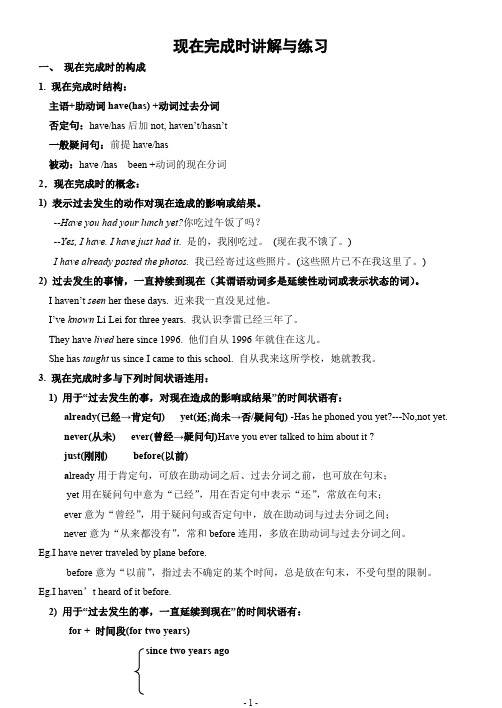
现在完成时讲解与练习一、现在完成时的构成1. 现在完成时结构:主语+助动词have(has) +动词过去分词否定句:have/has后加not, haven’t/hasn’t一般疑问句:前提have/has被动:have /has been +动词的现在分词2.现在完成时的概念:1) 表示过去发生的动作对现在造成的影响或结果。
--Have you had your lunch yet?你吃过午饭了吗?--Yes, I have. I have just had it. 是的,我刚吃过。
(现在我不饿了。
)I have already posted the photos. 我已经寄过这些照片。
(这些照片已不在我这里了。
)2) 过去发生的事情,一直持续到现在(其谓语动词多是延续性动词或表示状态的词)。
I haven’t seen her these days. 近来我一直没见过他。
I’ve known Li Lei for three years. 我认识李雷已经三年了。
They have lived here since 1996. 他们自从1996年就住在这儿。
She has taught us since I came to this school. 自从我来这所学校,她就教我。
3. 现在完成时多与下列时间状语连用:1) 用于“过去发生的事,对现在造成的影响或结果”的时间状语有:already(已经→肯定句) yet(还;尚未→否/疑问句) -Has he phoned you yet?---No,not yet.never(从未) ever(曾经→疑问句)Have you ever talked to him about it ?just(刚刚) before(以前)a lready 用于肯定句,可放在助动词之后、过去分词之前,也可放在句末;yet用在疑问句中意为“已经”,用在否定句中表示“还”,常放在句末;ever意为“曾经”,用于疑问句或否定句中,放在助动词与过去分词之间;never意为“从来都没有”,常和before连用,多放在助动词与过去分词之间。
现在完成时讲解(含讲解及习题)
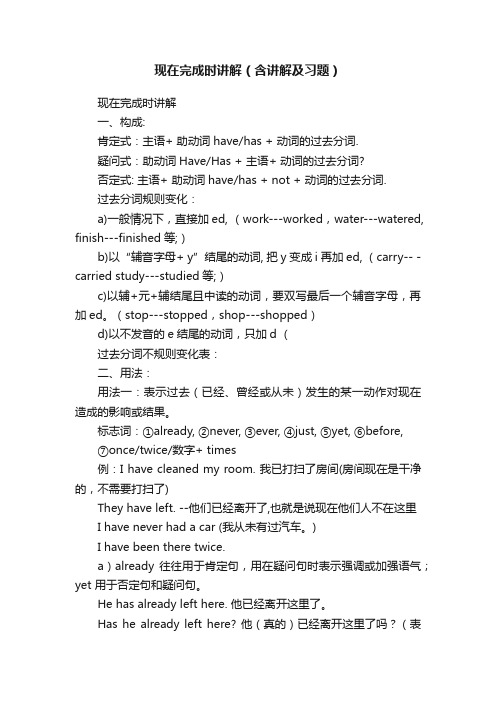
现在完成时讲解(含讲解及习题)现在完成时讲解一、构成:肯定式:主语+ 助动词have/has + 动词的过去分词.疑问式:助动词Have/Has + 主语+ 动词的过去分词?否定式: 主语+ 助动词have/has + not + 动词的过去分词.过去分词规则变化:a)一般情况下,直接加ed, (work---worked,water---watered, finish---finished等;)b)以“辅音字母+ y”结尾的动词, 把y 变成i 再加ed, (carry-- -carried study---studied等;)c)以辅+元+辅结尾且中读的动词,要双写最后一个辅音字母,再加ed。
(stop---stopped,shop---shopped)d)以不发音的e结尾的动词,只加d (过去分词不规则变化表:二、用法:用法一:表示过去(已经、曾经或从未)发生的某一动作对现在造成的影响或结果。
标志词:①already, ②never, ③ever, ④just, ⑤yet, ⑥before,⑦once/twice/数字+ times例:I have cleaned my room. 我已打扫了房间(房间现在是干净的,不需要打扫了)They have left. --他们已经离开了,也就是说现在他们人不在这里I have never had a car (我从未有过汽车。
)I have been there twice.a)already 往往用于肯定句,用在疑问句时表示强调或加强语气;yet 用于否定句和疑问句。
He has already left here. 他已经离开这里了。
Has he already left here? 他(真的)已经离开这里了吗?(表示加强语气)My teachers haven’t had breakfast yet. 我的老师们还没有吃早饭。
Have you written to your parents yet? 你已经给你父母写过信了吗?b)never 是否定词,表示“从来没有”,而ever 表示“曾经”We have never been to the Great Wall. 我们从来没有去过长城。
现在完成时讲解及练习(答案)
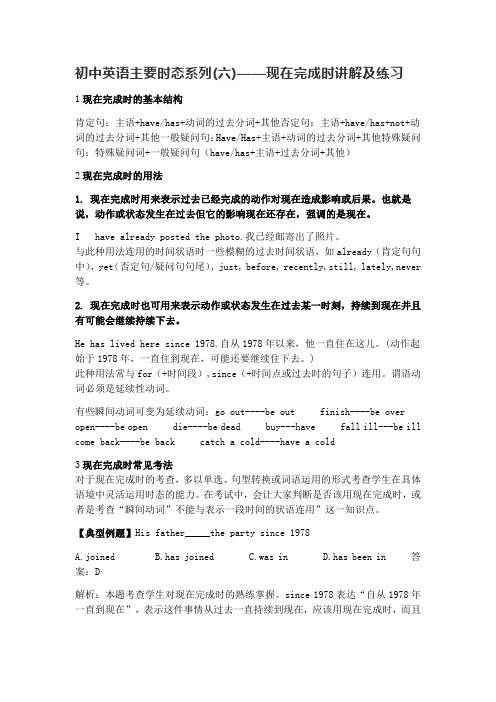
初中英语主要时态系列(六)——现在完成时讲解及练习1现在完成时的基本结构肯定句:主语+have/has+动词的过去分词+其他否定句:主语+have/has+not+动词的过去分词+其他一般疑问句:Have/Has+主语+动词的过去分词+其他特殊疑问句:特殊疑问词+一般疑问句(have/has+主语+过去分词+其他)2现在完成时的用法1. 现在完成时用来表示过去已经完成的动作对现在造成影响或后果。
也就是说,动作或状态发生在过去但它的影响现在还存在,强调的是现在。
I have already posted the photo.我已经邮寄出了照片。
与此种用法连用的时间状语时一些模糊的过去时间状语,如already(肯定句句中), yet(否定句/疑问句句尾), just, before, recently,still, lately,never 等。
2. 现在完成时也可用来表示动作或状态发生在过去某一时刻,持续到现在并且有可能会继续持续下去。
He has lived here since 1978.自从1978年以来,他一直住在这儿。
(动作起始于1978年,一直住到现在,可能还要继续住下去。
)此种用法常与for(+时间段),since(+时间点或过去时的句子)连用。
谓语动词必须是延续性动词。
有些瞬间动词可变为延续动词:go out----be out finish----be over open----be open die----be dead buy---have fall ill---be ill come back----be back catch a cold----have a cold3现在完成时常见考法对于现在完成时的考查,多以单选、句型转换或词语运用的形式考查学生在具体语境中灵活运用时态的能力。
在考试中,会让大家判断是否该用现在完成时,或者是考查“瞬间动词”不能与表示一段时间的状语连用”这一知识点。
初中现在完成时精讲+精练(附答案)

初中现在完成时精讲+精练(附答案)现在完成时The Present Perfect tense定义:1.现在完成时表示过去发生或已完成的动作对现在造成的影响;I have already had breakfast.(我已吃过早餐,我不饿了)2.现在完成时态还表示过去某一时间已经开始并一直持续到现在(还有持续下去的可能)的动作或状态,可以和表示延续的时间状语连用表示持续的动作或状态的动词多是延续性动词。
We have lived here for ten years.我们已经在这里住了10年了。
(从过去一直到现在都住在这里,并且还会一直持续)主语+ have/ has + 过去分词(pp)1) 表示到现在为止已经完成或刚刚完成的动作。
eg1:Now we have planted all the trees.我们现在刚把所有的树种好。
eg2: He has just come back.他刚刚回来。
eg3:They have built many buildings in this city.在这个城市里,他们已经建造了很多建筑物。
2) 表示过去发生的动作,强调结果或对现在的影响。
常与just、already、yet连用。
eg1:Someone has broken the window. (窗户现在是坏的)eg2: I have already lost the key. (我现在没有钥匙)e g3: I haven’t read that book yet . (不了解书的内容)eg4: I have just cleaned my hands. (手是干净的)※常与already(已经), yet(已经), just(刚刚),ever(曾经),never,for+时间段,since+时间点等词或短语连用.※already: 常用于肯定句中.yet: 常用于否定句,疑问句尾.3) 表示从过去开始并持续到现在的动作或状态,常与for和since 等表示一段时间的状语连用。
现在完成时讲解(含讲解及习题)

现在完成时讲解(含讲解及习题)现在完成时是表示过去某一动作对现在造成的影响或结果的一种时态。
它的构成方式是:主语+助动词have/has+动词的过去分词。
过去分词的规则变化有四种情况,一般情况下直接加ed,以“辅音字母+y”结尾的动词把y变成i再加ed,以辅+元+辅结尾且中读的动词要双写最后一个辅音字母再加ed,以不发音的e结尾的动词只加d。
过去分词不规则变化的情况需要记忆。
现在完成时的用法是表示过去已经、曾经或从未发生的某一动作对现在造成的影响或结果。
标志词包括already。
never。
ever。
just。
yet。
before。
once/twice/数字+times等。
例如,I have XXX.表示我已经打扫了房间,房间现在是干净的,不需要再打扫了。
They have left.表示他们已经离开了,也就是说现在他们人不在这里。
I have never had a car表示我从未有过汽车。
I have been there XXX表示我去过那里两次。
标志词的使用有一些规则。
already往往用于肯定句,用在疑问句时表示强调或加强语气;yet用于否定句和疑问句。
例如,He has already left here.表示他已经离开这里了。
Has he already left here?表示他(真的)已经离开这里了吗?(表示加强语气)。
XXX XXX.表示我的老师们还没有吃早饭。
Have you written to your parents yet?表示你已经给你父母写过信了吗?never是是否定词,表示“从来没有”,而XXX表示“曾经”。
例如,We have never been to the Great Wall.表示我们从来没有去过长城。
Have you ever been to Canada?表示你们曾经去过加拿大吗?just用于句中,表示“刚刚”。
I have just finished breakfast。
(完整版)高一现在完成时讲解及练习(含答案)
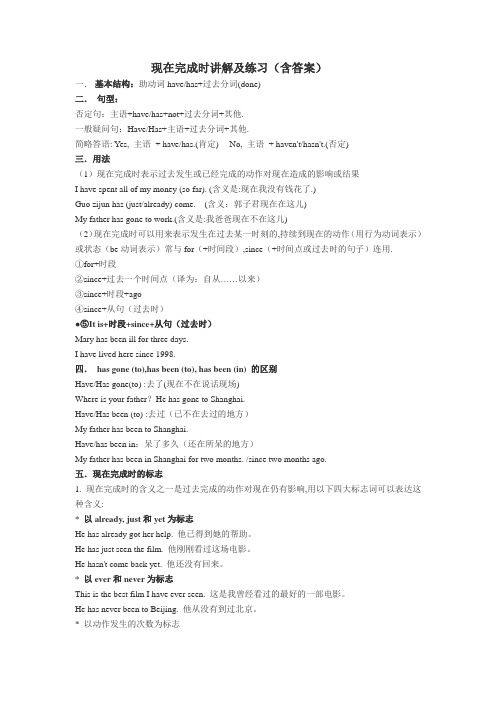
现在完成时讲解及练习(含答案)一.基本结构:助动词have/has+过去分词(done)二.句型:否定句:主语+have/has+not+过去分词+其他.一般疑问句:Have/Has+主语+过去分词+其他.简略答语: Yes, 主语+ have/has.(肯定) No, 主语+ haven't/hasn't.(否定)三.用法(1)现在完成时表示过去发生或已经完成的动作对现在造成的影响或结果I have spent all of my money (so far). (含义是:现在我没有钱花了.)Guo zijun has (just/already) come. (含义:郭子君现在在这儿)My father has gone to work.(含义是:我爸爸现在不在这儿)(2)现在完成时可以用来表示发生在过去某一时刻的,持续到现在的动作(用行为动词表示)或状态(be动词表示)常与for(+时间段),since(+时间点或过去时的句子)连用.①for+时段②since+过去一个时间点(译为:自从……以来)③since+时段+ago④since+从句(过去时)●⑤It is+时段+since+从句(过去时)Mary has been ill for three days.I have lived here since 1998.四.has gone (to),has been (to), has been (in) 的区别Have/Has gone(to) :去了(现在不在说话现场)Where is your father?He has gone to Shanghai.Have/Has been (to) :去过(已不在去过的地方)My father has been to Shanghai.Have/has been in:呆了多久(还在所呆的地方)My father has been in Shanghai for two months. /since two months ago.五.现在完成时的标志1. 现在完成时的含义之一是过去完成的动作对现在仍有影响,用以下四大标志词可以表达这种含义:* 以already, just和yet为标志He has already got her help. 他已得到她的帮助。
中考英语语法丨现在完成时详解(附练习题及答案)
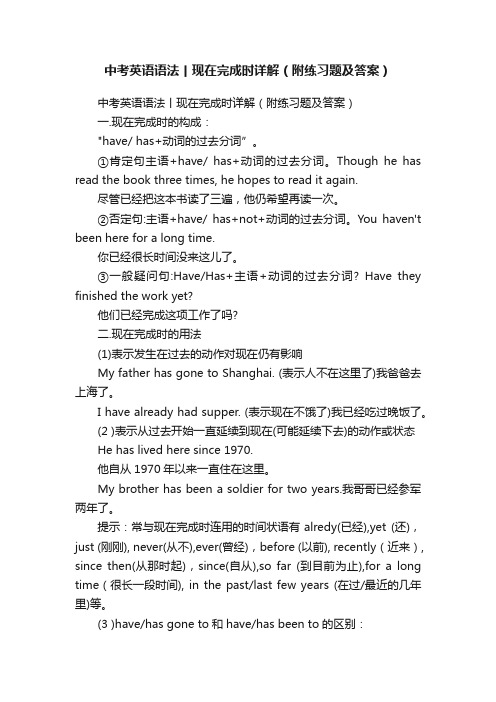
中考英语语法丨现在完成时详解(附练习题及答案)中考英语语法丨现在完成时详解(附练习题及答案)一.现在完成时的构成:"have/ has+动词的过去分词”。
①肯定句主语+have/ has+动词的过去分词。
Though he has read the book three times, he hopes to read it again.尽管已经把这本书读了三遍,他仍希望再读一次。
②否定句:主语+have/ has+not+动词的过去分词。
You haven't been here for a long time.你已经很长时间没来这儿了。
③一般疑问句:Have/Has+主语+动词的过去分词? Have they finished the work yet?他们已经完成这项工作了吗?二.现在完成时的用法(1)表示发生在过去的动作对现在仍有影响My father has gone to Shanghai. (表示人不在这里了)我爸爸去上海了。
I have already had supper. (表示现在不饿了)我已经吃过晚饭了。
(2 )表示从过去开始一直延续到现在(可能延续下去)的动作或状态He has lived here since 1970.他自从1970年以来一直住在这里。
My brother has been a soldier for two years.我哥哥已经参军两年了。
提示:常与现在完成时连用的时间状语有alredy(已经),yet (还),just (刚刚), never(从不),ever(曾经),before (以前), recently(近来), since then(从那时起),since(自从),so far (到目前为止),for a long time(很长一段时间), in the past/last few years (在过/最近的几年里)等。
现在完成时讲解及练习(附答案)-名师精讲(新)

现在完成时先看几个例句:1. I have cleaned my room. 我已打扫了房间。
2. He hasn’t finished his homework. 他还没完成作业。
3. Have you read this novel ? 你看过这本小说吗?Yes , I have. 是的,看过了。
No, I haven’t. 不,没看过。
4. We have studied English for two years.我们已经学了两年英语了。
5. They haven’t seen each other since 1998.自从1998年他们就没再见过面。
一、构成:肯定式:主语+ 助动词have/has + 动词的过去分词.疑问式:助动词Have/Has + 主语+ 动词的过去分词?否定式: 主语+ 助动词have/has + not + 动词的过去分词.例:I have worked here for 3 years.否定句:疑问句:回答:就划线部分提问:过去分词的构成分为规则变化和不规则变化两种:规则变化:a) 一般情况下,在动词后直接加ed, 如play---played, work---worked,water---watered, finish---finished等;b) 以“辅音字母+ y”结尾的动词, 把y 变成i 再加ed, carry-- -carried study---studied等;c) 以一个辅音字母结尾的重读闭音节的动词要双写最后一个辅音字母,再加ed 如: stop---stopped,shop---shopped等。
不规则变化:见一般时当中的不规则动词表点击→不规则动词表写出下列动词的过去分词:put--- hear--- come---make--- hurry--- watch---swim--- be--- talk---want--- study--- stop---take--- see--- like---二、用法:1.表示过去发生的某一动作对现在造成的影响或结果。
英语现在完成时精讲+精练(附答案)

英语现在完成时精讲+精练(附答案)英语中的现在完成时表示过去发生的事情对现在产生的影响或仍在继续的动作,结构为“have/has + 过去分词”。
本篇文章将对现在完成时的用法进行详细讲解和练。
一、现在完成时的主要用法现在完成时有以下三种主要用法:1. 表示过去发生的动作对现在产生的影响例如:- I have lost my phone.(我手机丢了。
)- She has forgotten the meeting.(她忘了会议。
)以上两句话中,手机丢了和会议被忘了都是在过去发生的事情,但是现在失去手机和忘记会议都对现在产生影响,因此需要用现在完成时来表达。
2. 表示从过去某个时间开始一直持续到现在的动作例如:- I have worked here for two years.(我在这里工作已经两年了。
)- They have been married since 2010.(他们自 2010 年以来就结婚了。
)以上两个句子都是表示从过去某个时间开始到现在一直持续的动作,需要用现在完成时来表达。
3. 表示刚刚发生的动作例如:- I have just finished my homework.(我刚刚完成了我的作业。
)- He has just arrived.(他刚刚到了。
)以上两句话中,都是刚刚发生的动作,需要用现在完成时来表达。
二、现在完成时的结构现在完成时的结构为“have/has + 过去分词”:- have + 过去分词,用于第一人称复数(we)、第二人称复数(you)和第三人称复数(they)以及第一人称单数(I)与第二人称单数(you)构成疑问句和否定句。
- has + 过去分词,用于第三人称单数(he、she、it)构成一般句。
例如:- I have visited London twice.(我去过伦敦两次。
)- Have you finished your homework?(你完成作业了吗?)- She has seen the movie before.(她之前看过这部电影。
现在完成时精讲及习题答案
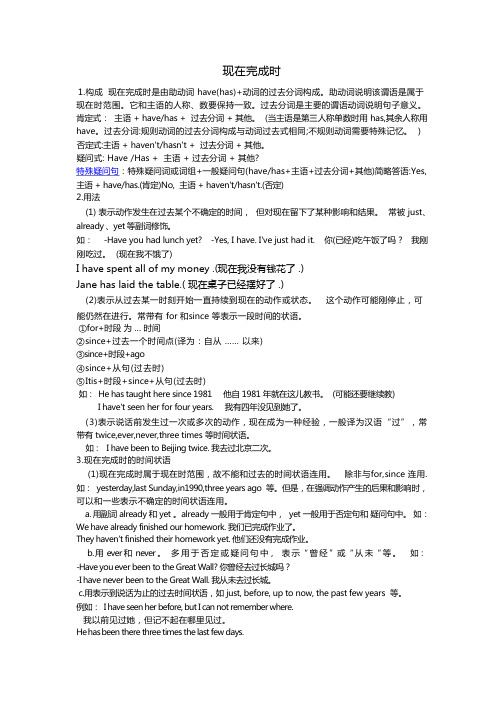
现在完成时1.构成现在完成时是由助动词 have(has)+动词的过去分词构成。
助动词说明该谓语是属于现在时范围。
它和主语的人称、数要保持一致。
过去分词是主要的谓语动词说明句子意义。
肯定式:主语 + have/has + 过去分词 + 其他。
(当主语是第三人称单数时用 has,其余人称用have。
过去分词:规则动词的过去分词构成与动词过去式相同;不规则动词需要特殊记忆。
) 否定式:主语 + haven't/hasn't + 过去分词 + 其他。
疑问式: Have /Has + 主语 + 过去分词 + 其他?特殊疑问句:特殊疑问词或词组+一般疑问句(have/has+主语+过去分词+其他)简略答语:Yes, 主语 + have/has.(肯定)No, 主语 + haven't/hasn't.(否定)2.用法(1) 表示动作发生在过去某个不确定的时间,但对现在留下了某种影响和结果。
常被 just、already 、yet 等副词修饰。
如: -Have you had lunch yet? -Yes, I have. I've just had it. 你(已经)吃午饭了吗?我刚刚吃过。
(现在我不饿了)I have spent all of my money .(现在我没有钱花了 .)Jane has laid the table.( 现在桌子已经摆好了 .)(2)表示从过去某一时刻开始一直持续到现在的动作或状态。
这个动作可能刚停止,可能仍然在进行。
常带有 for 和since 等表示一段时间的状语。
①for+时段为… 时间②since+过去一个时间点(译为:自从…… 以来)③since+时段+ago④since+从句(过去时)⑤Itis+时段+since+从句(过去时)如: He has taught here since 1981 他自 1981 年就在这儿教书。
现在完成时讲解及练习(含答案)
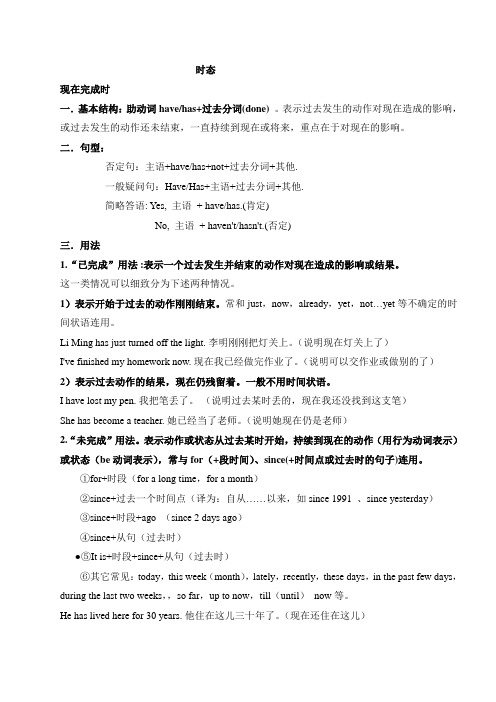
时态现在完成时一.基本结构:助动词have/has+过去分词(done) 。
表示过去发生的动作对现在造成的影响,或过去发生的动作还未结束,一直持续到现在或将来,重点在于对现在的影响。
二.句型:否定句:主语+have/has+not+过去分词+其他.一般疑问句:Have/Has+主语+过去分词+其他.简略答语: Yes, 主语+ have/has.(肯定)No, 主语+ haven't/hasn't.(否定)三.用法1.“已完成”用法 :表示一个过去发生并结束的动作对现在造成的影响或结果。
这一类情况可以细致分为下述两种情况。
1)表示开始于过去的动作刚刚结束。
常和just,now,already,yet,not…yet等不确定的时间状语连用。
Li Ming has just turned off the light. 李明刚刚把灯关上。
(说明现在灯关上了)I've finished my homework now. 现在我已经做完作业了。
(说明可以交作业或做别的了)2)表示过去动作的结果,现在仍残留着。
一般不用时间状语。
I have lost my pen. 我把笔丢了。
(说明过去某时丢的,现在我还没找到这支笔)She has become a teacher. 她已经当了老师。
(说明她现在仍是老师)2.“未完成”用法。
表示动作或状态从过去某时开始,持续到现在的动作(用行为动词表示)或状态(be动词表示),常与for(+段时间)、since(+时间点或过去时的句子)连用。
①for+时段(for a long time,for a month)②since+过去一个时间点(译为:自从……以来,如since 1991 、since yesterday)③since+时段+ago (since 2 days ago)④since+从句(过去时)●⑤It is+时段+since+从句(过去时)⑥其它常见:today,this week(month),lately,recently,these days,in the past few days,during the last two weeks,,so far,up to now,till(until)now等。
(英语)初中英语现在完成时解题技巧讲解及练习题(含答案)及解析
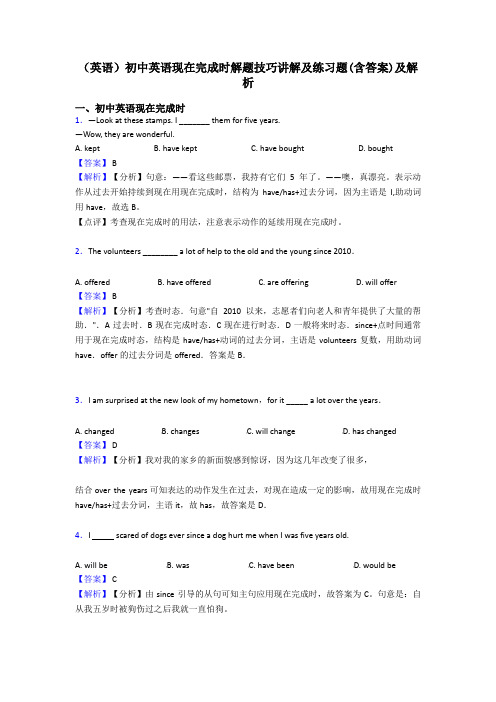
(英语)初中英语现在完成时解题技巧讲解及练习题(含答案)及解析一、初中英语现在完成时1.—Look at these stamps. I _______ them for five years.—Wow, they are wonderful.A. keptB. have keptC. have boughtD. bought【答案】 B【解析】【分析】句意:——看这些邮票,我持有它们5年了。
——噢,真漂亮。
表示动作从过去开始持续到现在用现在完成时,结构为have/has+过去分词,因为主语是I,助动词用have,故选B。
【点评】考查现在完成时的用法,注意表示动作的延续用现在完成时。
2.The volunteers ________ a lot of help to the old and the young since 2010.A. offeredB. have offeredC. are offeringD. will offer【答案】 B【解析】【分析】考查时态.句意"自2010以来,志愿者们向老人和青年提供了大量的帮助.".A过去时.B现在完成时态.C现在进行时态.D一般将来时态.since+点时间通常用于现在完成时态,结构是have/has+动词的过去分词,主语是volunteers复数,用助动词have.offer的过去分词是offered.答案是B.3.I am surprised at the new look of my hometown,for it _____ a lot over the years.A. changedB. changesC. will changeD. has changed【答案】 D【解析】【分析】我对我的家乡的新面貌感到惊讶,因为这几年改变了很多,结合over the years可知表达的动作发生在过去,对现在造成一定的影响,故用现在完成时have/has+过去分词,主语it,故has,故答案是D.4.I scared of dogs ever since a dog hurt me when I was five years old.A. will beB. wasC. have beenD. would be【答案】 C【解析】【分析】由since引导的从句可知主句应用现在完成时,故答案为C。
- 1、下载文档前请自行甄别文档内容的完整性,平台不提供额外的编辑、内容补充、找答案等附加服务。
- 2、"仅部分预览"的文档,不可在线预览部分如存在完整性等问题,可反馈申请退款(可完整预览的文档不适用该条件!)。
- 3、如文档侵犯您的权益,请联系客服反馈,我们会尽快为您处理(人工客服工作时间:9:00-18:30)。
现在完成时讲解及练习(附答案)-名师精讲现在完成时先看几个例句:1. I have cleaned my room. 我已打扫了房间。
2. He hasn’t finished his homework. 他还没完成作业。
3. Have you read this novel ? 你看过这本小说吗?: make--- hurry---watch---swim--- be--- talk---want--- study--- stop---take--- see--- like---二、用法:1.表示过去发生的某一动作对现在造成的影响或结果。
I have cleaned my room. 我已打扫了房间(房间现在是干净的,不需要打扫了)They have left. --他们已经离开了,也就是说现在他们人不在这里I have had my lunch.--我已经吃过午饭了,也就是说我现在不饿2.表示过去已经开始, 持续到现在的动作或状态,I have learnt English for more than ten years.我已经学了10多年的英语。
She has swum since half an hour ago.我已经游泳了半个小时3表示人曾有过或到目前为止从未有过的经历.I have never had a car (我从未有过汽车。
)I have been there twice.动词填空:1._____ you ________(clean) the room?Yes, we __________(do) that already.When _______ you ______(do) it?We _______(do) it an hour ago.2.______ he ______(see) this film yet? Yes.When _____ he _____(see) it?He ______ it last week.3. How many times _____you______(be) there?三、标志词◆常与①already, ②never, ③ever,④just,⑤yet, ⑥before, ⑦up to now,⑧so far,⑨for the last few weeks ⑾since ⑿for along time/for标志词的区别1.for +一段时间Eg. I have been here for 5 weeks.He’s studied English for 3 years.2. since +(表示过去某一时间的)时间点/单词/词组/ 从句(一般过去时)Eg. I have been here since 2000.I have been here since 5 years ago.I have been here since I graduated in 2000.注2): 对for或since引导的时间状语提问必须用how long, 决不能用when.How long have you lived here?Eg. I have lived here for 10 years.注3): 短暂性动词不能和for或since引导的时间状语连用, 当然也不能用于how long引导的问句中Eg.(误)I have left there for 5 years.(正)I have been away there for 5 years.选用for和since填空:1.We haven’t seen each other ______ a long time.2.His father has been in the Party ______ 10 years ago.3.The film has been on ______ 20 minutes.4.Mr Green has worked here ______ he came to China.5.His grandparents have been dead ______ several years.6. It’s five years _______ we met last time.a)already 往往用于肯定句,用在疑问句时表示强调或加强语气;yet 用于否定句和疑问句。
•He has already left here.他已经离开这里了。
•Has he already left here?他(真的)已经离开这里了吗?(表示加强语气)•My teachers haven’t had breakfast yet.我的老师们还没有吃早饭。
•Have you written to your parents yet?你已经给你父母写过信了吗?b)never 是否定词,表示“从来没有”,而ever 表示“曾经”•We have never been to the Great Wall.我们从来没有去过长城。
•Have you ever been to Canada?你们曾经去过加拿大吗?c. just用于句中, 表示“刚刚”Eg. I’ve just had breakfast.What have they just done?d. before在现在完成时中的用法用于句末, 表示“以前”Eg. I’ve seen it before.四、短暂性动词在肯定句、疑问句中不能与时间段连用,这些动词是:①become, ②begin, ③buy, ④在没有关系。
eg:He has bought an English-Chinese dictionary. 他已经买了一本英汉字典。
He bought an English-Chinese dictionary. 他曾买过一本英汉字典。
H第一句用现在完成时时态,想表达意为:“He bought an English-Chinese dictionary. And he still has it”“过去他买了一本英汉字典,现在他还有这本字典”。
H第二句用过去时只叙述过去他买过一本英汉字典这一事实,至于现在他是否有这本字典并未强调说明。
2.常与一般过去时连用的典型的表示过去时间的状语: yesterday(昨天), the day before yesterday(前天), just now(刚才),时间+ ago, last +时间等;eg: The plane took off ten minutes ago.We finished our task last week .六、完成时辨析)have/has gone to,have/has been to和have/has been in 的区别have/has gone to: 表示某人已经去了某地现在还没回来, 可能现在正在某地或者正在去那里或回来的路上.have/has been to: 表示某人曾经去过某地, 但现在己经不在某地.Have/has been in:某人在某地1.Mike and his parents __________ the north for halfa year.2.Mum is not at home now. she _________ the shop.3.______ you ever _____ to kunming ? Never.4.Where _____ you ______ these days?5.Has Jim arrived yet?Yes, he _______ here for several days.6.Where is Peter? I don’t know where he ________.7.Hi Jim! Where _____ you _____ ?Li Lei is looking for you.完成时练习4. I __________ (read) the novel twice. It’s interesting.5. She _________(go) to Pairs, hasn’t she? Yes.How ______ she _______(go) there?She _______(go) there by air.6. So far, many countries _______________(develop)their software programs.7.Mr Chen ______(give)up smoking last year.8.Mr Chen __________(give) up smoking since last year.、翻译下列句子:1. 你曾经吃过鱼和薯条吗?2. 我刚刚丢了我的语文书。
3. 我以前从来没去过那个公园。
4. 他已经吃过午饭了。
5. 你已经看过这部电影了吗?6. 我哥哥还没回来。
7. 我自从上星期看过这部电影。
8. 自从1992年他住在这里。
9.这本字典我已买了三年了。
10.他离开中国三年了1.Have you eatten fish and french frise?2.I have lost my Chinese book.3 I have never been to that park. 4.He has already had lunch.5 Have you seen this movie yet?6 My brother has not returned.7 I have seen this movie since last week. 8 He has lived here since 1992.9 I have had this dictionary for three years. 10 He has been away China for three years.一、用所给词的正确形式填空1. Wei Fang isn't here. She______(go)to the reading room.2. Zhang Hong ______(make)many friends since she came to Paris.3. She _______(work)in this factory for ten years.4. They ______(not hear)from each other since 1995.5. —___________ you ___________(finish)your homework yet?—No, not yet.6. — Where is Jim?—He ______(go)to Canada.7. How long ______you______(be)at this school?8. I_______(have)breakfast already.9. She ______(study)English for three years.10. I _______ never_______ (see)such a wonderful match before。
